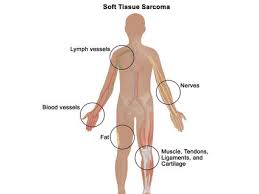 Alveolar soft part sarcoma,(ASPS), is a cancer that can come from different types of soft tissue, such as muscle, fat, or nerves.
Alveolar soft part sarcoma,(ASPS), is a cancer that can come from different types of soft tissue, such as muscle, fat, or nerves.
Usually starts in the leg, although it can also begin in other parts of the body, including the arms, head, or neck.
It starts as a painless lump.
ASPS tends to spread early.
Soft tissue sarcomas make up 1% of all cancers and ASPS makes up only 0.2% to 1% of all soft tissue sarcomas.
There are about 80 cases diagnosed per year in the United States.
Metastatic ASPS spreads early, but it grows much slower than many other sarcomas.
People with ASPS can live for a long time.
Surgery: Surgery is often used to remove the main tumor without harming the healthy tissue.
Radiation therapy: Radiation therapy can be used around the time of surgery.
Chemotherapy does not work for ASPS.
In ASPS, a gene called TFE3 joins with a region called ASPCR1.
About 80% of people whose cancer has not spread are alive five years after they are diagnosed with ASPS.
Children with ASPS that has not spread have a better chance of survival than adults.
If the cancer has spread to other parts of the body, 10% to 40% of people survive five years after diagnosis, depending on whether they have surgery.
Atezolizumab, a anti-programmed, death ligand 1 (PD – L1) agent is effective in inducing sustained responses in approximately 1/3 of patients with advanced ASPS.
